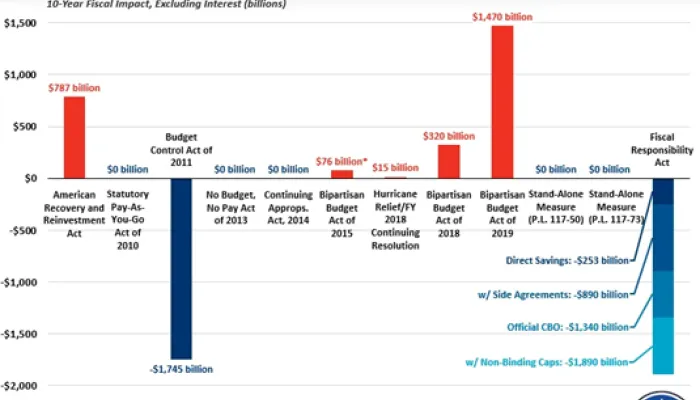Event Recap: Better Budget Process Summit
On February 26, the Committee for a Responsible Federal Budget hosted the first annual Better Budget Process Summit on “Rebuilding Confidence in Congress: Breaking Through on Budget Reform.” The event brought together budget experts and stakeholders from across the ideological spectrum to discuss ways to improve the current broken budget and appropriations process. After two expert panels on budget process reform, the summit concluded with a session featuring Senators David Perdue (R-GA) and Sheldon Whitehouse (D-RI), members of the newly-formed Joint Select Committee on Budget and Appropriations Process Reform.
Watch the event below or via C-SPAN 3:
CRFB president Maya MacGuineas opened the summit by sharing her concerns about the deteriorated state of the budget and appropriations process and the need to work together to restore a functioning system. She discussed her work on budget solutions as part of the Better Budget Process Initiative as well as dialogues with the National Budgeting Roundtable with colleagues Stuart Butler and the late Paul Posner. MacGuineas mentioned that among the most pressing budget issues is the need to improve the transparency of the budget process so that the public knows where accountability lies when the government fails to pass a budget. She pointed to the prevalence of gimmicks and their distorting of the budget, citing the recently released report Playing by the (Budget) Rules: Understanding and Preventing Budget Gimmicks. MacGuineas also turned to the budget’s failure to focus on the long term, highlighting the lack of an economic strategy or fiscal plan. She concluded with how the current budget process leads to very poor outcomes, and expressed her hope that it is possible to change the rules and process to nudge policy makers towards making better decisions.
Next, Robert Fersh, president and founder of the Convergence Center for Policy Resolution, introduced Convergence’s final proposals in their Building a Better Budget Process (B3P) project. The first panel, moderated by B3P’s director Susan Willie, discussed the B3P recommendations with project participants Neil Bradley of the U.S. Chamber of Commerce, Matthew Owens of the Association of American Universities, and Emily Holubowich of the Coalition for Health Funding.
They introduced the nine underlying principles that guided their development of budget reform proposals: comprehensive, unbiased, strategic, inclusive, durable, informed, transparent, predictable, and simple. They then introduced four key themes that had encountered when determining effective incentives and consequences for devising a new budget process: elections drive outcomes, timely credible information matters, effective budget institutions are crucial, and new norms are needed to break bad budget habits.
The panel offered and discussed five final proposals. First, Congress and the President should negotiate a two-year Budget Action Plan at the beginning of a new Congress in an effort to line up election cycles with the budget cycle. Second, a Fiscal State of the Nation should be published every four years to highlight the condition of the nation’s finances. Third, Congress should review the performance of long-term and inter-generational portfolios of federal programs to evaluate their health and needs. Fourth, Congress should strengthen the Budget Committees with more powerful membership and new oversight abilities. Finally, Congress should provide the Congressional Budget Office (CBO) and Joint Committee on Taxation (JCT) with the resources they need to continue providing high-quality budget information that informs budgetary decisions.
The second panel, moderated by Peter Cohn of CQ, included Stuart Butler of the Brookings Institution, Steve Redburn of The George Washington University, and Frances Lee of the University of Maryland. They discussed the B3P proposals and offered comments on them. Redburn suggested abandoning the distinction between discretionary and mandatory programs and instead separating annual caps or targets for investment spending and tax expenditures. He also suggested a three-year allocation plan instead of the proposed two-year plan. Butler emphasized that the goal of the proposals was not to “reach for the moon,” but to build a set of foundations to help members of the public and Congress take subsequent steps down the road. Lee discussed the history of budget and appropriations process reform, pointing to four key lessons she had found from past efforts. She said that enduring reforms need to enacted based on broad, bipartisan consensus with “common carriers,” meaning that members can agree on new processes and procedures despite disagreeing on what they hope to obtain from them. Lee noted that successful reforms were designed so as to limit disruptions to existing legislative turf and will need to be designed under the notion that they will evolve over time.
The summit concluded with a discussion between Maya MacGuineas and Senators Whitehouse and Perdue. MacGuineas opened by asking what problems they should be trying to solve with budget process reform. Whitehouse answered that the underlying problem is with the Budget Committee itself. For him, that means three things: first, that there must be a penalty for blowing through the budget; second, that the Budget Committee only focuses on certain parts of the budget when it should take a more comprehensive approach; and third, that there has to be some value or reward for a bipartisan process.
Perdue noted that the “budget process is absolutely broken.” He raised the concern that the current system does not allow for active debate; instead, it allows the majority party to cram its version of the nation’s financial future down the throat of the minority party. He went on to say that the problem does not lie with particular committees, but rather the entire structure of the process. He emphasized that there are many ways to budget so that consequences and due dates remain important. The two critical due dates, he said, are first completing the budget early in the year and then going through the appropriations process before the last day of the fiscal year.
Whitehouse said that the appropriators and leadership are the big winners in all of this because of the absence of any oversight and transparency. He described how whenever the government approaches a shutdown, the appropriations subcommittees end up putting together the budget package alone behind closed doors without input from non-committee members.
Discussion moved to the issue of the debt ceiling, which Whitehouse said was a waste of time. He said that a more sensible way to solve the problem would be to have a long-term glideslope to a sustainable debt-to-GDP ratio with some guardrails to police. Perdue agreed that the debt ceiling doesn’t work properly.
MacGuineas discussed bipartisan cooperation and asked how to get out of “the hole we dug ourselves.” Whitehouse said the process needed to be fixed so that it would stop rewarding partisanship. Perdue agreed. He said that the new joint select committee was necessary, because the budget committee is structured in such a way that it is not capable of fixing the process.
Hopefully this discussion is the start of more bipartisan conversation on budget process reform. We thank Senators Whitehouse and Perdue their participation and all of our panelists for their thoughtful comments.
The summit also included a video remembering CRFB senior advisor Ed Lorenzen, who tragically passed away in January with his son, Michael. You can view the video here.
Learn more about the budget process and efforts to improve it by checking out the summit materials below:
- The Better Budget Process Initiative
- Budget Process Issue Page
- Event Agenda
- Playing by the (Budget) Rules: Understanding and Prevent Budget Gimmicks
- Convergence Center for Policy Resolution Summary of the Proposals
- Convergence Building a Better Budget Process Final Report
- Statement from Convergence President Robert Fersh
- Better Budget Process Initiative's Budget Process Reform Options
- A Long-Term Budget for Entitlements and Required Revenues
- Portfolio Budgeting: How a New Approach to the Budget Could Yield Better Decisions
- Lessons from Successful Budget Reforms
- Budget Summit to Spur Action on Reform


